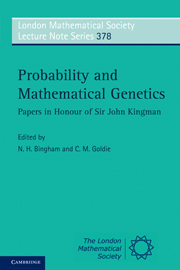Book contents
- Frontmatter
- Contents
- List of contributors
- Preface
- Bibliography of J. F. C. Kingman
- 1 A fragment of autobiography, 1957–1967
- 2 More uses of exchangeability: representations of complex random structures
- 3 Perfect simulation using dominated coupling from the past with application to area-interaction point processes and wavelet thresholding
- 4 Assessing molecular variability in cancer genomes
- 5 Branching out
- 6 Kingman, category and combinatorics
- 7 Long-range dependence in a Cox process directed by an alternating renewal process
- 8 Kernel methods and minimum contrast estimators for empirical deconvolution
- 9 The coalescent and its descendants
- 10 Kingman and mathematical population genetics
- 11 Characterizations of exchangeable partitions and random discrete distributions by deletion properties
- 12 Applying coupon-collecting theory to computer-aided assessments
- 13 Colouring and breaking sticks: random distributions and heterogeneous clustering
- 14 The associated random walk and martingales in random walks with stationary increments
- 15 Diffusion processes and coalescent trees
- 16 Three problems for the clairvoyant demon
- 17 Homogenization for advection-diffusion in a perforated domain
- 18 Heavy traffic on a controlled motorway
- 19 Coupling time distribution asymptotics for some couplings of the Lévy stochastic area
- 20 Queueing with neighbours
- 21 Optimal information feed
- 22 A dynamical-system picture of a simple branching-process phase transition
- Index
6 - Kingman, category and combinatorics
Published online by Cambridge University Press: 07 September 2011
- Frontmatter
- Contents
- List of contributors
- Preface
- Bibliography of J. F. C. Kingman
- 1 A fragment of autobiography, 1957–1967
- 2 More uses of exchangeability: representations of complex random structures
- 3 Perfect simulation using dominated coupling from the past with application to area-interaction point processes and wavelet thresholding
- 4 Assessing molecular variability in cancer genomes
- 5 Branching out
- 6 Kingman, category and combinatorics
- 7 Long-range dependence in a Cox process directed by an alternating renewal process
- 8 Kernel methods and minimum contrast estimators for empirical deconvolution
- 9 The coalescent and its descendants
- 10 Kingman and mathematical population genetics
- 11 Characterizations of exchangeable partitions and random discrete distributions by deletion properties
- 12 Applying coupon-collecting theory to computer-aided assessments
- 13 Colouring and breaking sticks: random distributions and heterogeneous clustering
- 14 The associated random walk and martingales in random walks with stationary increments
- 15 Diffusion processes and coalescent trees
- 16 Three problems for the clairvoyant demon
- 17 Homogenization for advection-diffusion in a perforated domain
- 18 Heavy traffic on a controlled motorway
- 19 Coupling time distribution asymptotics for some couplings of the Lévy stochastic area
- 20 Queueing with neighbours
- 21 Optimal information feed
- 22 A dynamical-system picture of a simple branching-process phase transition
- Index
Summary
Abstract
Kingman's Theorem on skeleton limits—passing from limits as n → ∞ along nh (n ∈ ℕ) for enough h > 0 to limits as t → ∞ for t ∈ ℝ— is generalized to a Baire/measurable setting via a topological approach. We explore its affinity with a combinatorial theorem due to Kestelman and to Borwein and Ditor, and another due to Bergelson, Hindman and Weiss. As applications, a theory of ‘rational’ skeletons akin to Kingman's integer skeletons, and more appropriate to a measurable setting, is developed, and two combinatorial results in the spirit of van der Waerden's celebrated theorem on arithmetic progressions are given.
Keywords Baire property, bitopology, complete metrizability, density topology, discrete skeleton, essential contiguity, generic property, infinite combinatorics, measurable function, Ramsey theory, Steinhaus theory
AMS subject classification (MSC2010) 26A03
Introduction
The background to the theme of the title is Feller's theory of recurrent events. This goes back to Feller in 1949 [F1], and received its first textbook synthesis in [F2] (see e.g. [GS] for a recent treatment). One is interested in something (‘it’, let us say for now—we can proceed informally here, referring to the above for details) that happens (by default, or by fiat) at time 0, may or may not happen at discrete times n = 1, 2, …, and is such that its happening ‘resets the clock’, so that if one treats this random time as a new time-origin, the subsequent history is a probabilistic replica of the original situation.
- Type
- Chapter
- Information
- Probability and Mathematical GeneticsPapers in Honour of Sir John Kingman, pp. 135 - 168Publisher: Cambridge University PressPrint publication year: 2010
- 5
- Cited by



